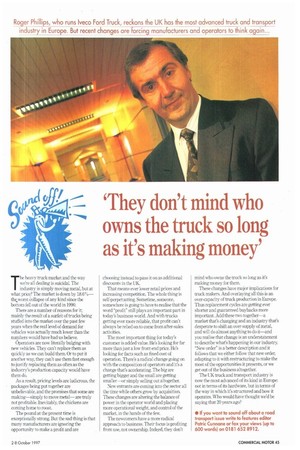'They don't mind who owns the truck so long as it's making money'
Page 47

If you've noticed an error in this article please click here to report it so we can fix it.
The heavy truck market and the way we're all dealing is suicidal. The industry is simply moving metal, but at what price? The market is down by 18.6%— the...worst collapse of any kind since the bottom fell out of the world in 1990.
There are a number of reasons for it; mainly the result of a surfeit of trucks being stuffed into the market over the past few years when the real level of demand for vehicles was actually much lower than the numbers would have had us believe.
Operators are now literally bulging with new vehicles. They can't replace them as quickly as we can build them, Or to put it another way, they can't use them fast enough to justify replacing them as often as the industry's production capacity would have them do.
As a result, pricing levels are ludicrous, the packages being put together are unbelievable, and the promises that some are making—simply to move metal— are truly not profitable. Inevitably, the chickens are coming home to roost.
The pound at the present time is exceptionally strong, But the sad thing is that many manufacturers are ignoring the opportunity to make a profit and are choosing instead to pass it on as additional discounts in the UK.
That means ever lower retail prices and increasing competition. The whole thing is self-perpetuating. Sometime, someone, somewhere is going to have to realise that the word "profit" still plays an important part in today's business world. And with trucks getting ever more reliable, that profit can't always be relied on to come from after-sales activities.
The most important thing for today's customer is added value. He's looking for far more than just a low front-end price. He's looking for facts such as fixed cost of operation. There's a radical change going on with the composition of operators and its a change that's accelerating. The big are getting bigger and the small are getting smaller--or simply selling out altogether.
New entrants are coming into the sector all the time while others grow by acquisition. These changes are altering the balance of power in the operator world and placing more operational weight, and control of the market, in the hands of the few.
The newcomers have a more radical approach to business, Their focus is profiting from use, not ownership. Indeed, they don't mind who owns the truck so long as it's making money for them.
These changes have major implications for truck makers. And overlaying all this is an over-capacity of truck production in Europe. Thus replacement cycles are getting ever shorter and guaranteed buybacks more important. Add these two together a market that's changing and an industry that's desperate to shift an over-supply of metal, and will do almost anything to do it—and you realise that change is an understatement to describe what's happening in our industry. "New order" is a better description and it follows that we either follow that new order, adapting to it with restructuring to make the most of the opportunities it presents, or we get out of the business altogether: The UK truck and transport industry is now the most advanced of its kind in Europe: not in terms of its hardware, but in terms of the way in which it's structured and how it operates. Who would have thought we'd be saying that 20 years ago?








































































































